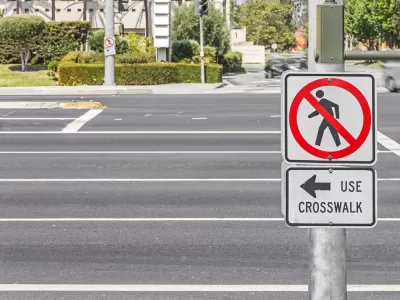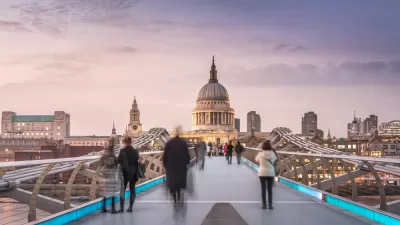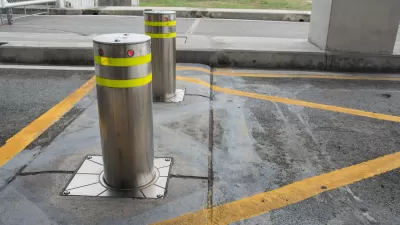Plenty of sidewalks stand in need of improvement, and many aren't there at all. But they're also a symbol of the automobile's engineered dominance of our roads.

According to Alissa Walker, the multi-modal city of the future might lack sidewalks, and that's a good thing. "'Sidewalks' is actually a misnomer," Walker writes, "because before cars existed, all modes of transportation mixed freely in the street: streetcars, carriages, horses, pushcarts, and, most of all, people walking in every direction."
The rise of the automobile pushed pedestrians to the side, and modern roads often deny them a place to walk altogether. "American society has so normalized our inferior sidewalk system that we don't believe we deserve a place to walk."
Meanwhile, a supposed "walking revolution" hasn't materialized, despite Complete Streets redesigns and campaigns to promote walking. "In 2016, Americans drove more miles than they have in any other year in history."
Frustratingly, says Walker, pedestrian improvements are now often perceived as a sign of gentrification. "Yet clean, safe, unbroken sidewalks have become such a rarity in this country that designing an area where people can get around primarily by walking—the one mode of transportation that is available and accessible to everyone—is now seen as a harbinger of displacement."
Truly shared streets would open up space for new modes, and a return to old ones. And as boomers age out of driving, we may see rising momentum for real pedestrian improvements.
FULL STORY: The case against sidewalks

Planetizen Federal Action Tracker
A weekly monitor of how Trump’s orders and actions are impacting planners and planning in America.

Restaurant Patios Were a Pandemic Win — Why Were They so Hard to Keep?
Social distancing requirements and changes in travel patterns prompted cities to pilot new uses for street and sidewalk space. Then it got complicated.

Maui's Vacation Rental Debate Turns Ugly
Verbal attacks, misinformation campaigns and fistfights plague a high-stakes debate to convert thousands of vacation rentals into long-term housing.

Boulder Eliminates Parking Minimums Citywide
Officials estimate the cost of building a single underground parking space at up to $100,000.

Orange County, Florida Adopts Largest US “Sprawl Repair” Code
The ‘Orange Code’ seeks to rectify decades of sprawl-inducing, car-oriented development.

Maui's Vacation Rental Debate Turns Ugly
Verbal attacks, misinformation campaigns and fistfights plague a high-stakes debate to convert thousands of vacation rentals into long-term housing.
Urban Design for Planners 1: Software Tools
This six-course series explores essential urban design concepts using open source software and equips planners with the tools they need to participate fully in the urban design process.
Planning for Universal Design
Learn the tools for implementing Universal Design in planning regulations.
Heyer Gruel & Associates PA
JM Goldson LLC
Custer County Colorado
City of Camden Redevelopment Agency
City of Astoria
Transportation Research & Education Center (TREC) at Portland State University
Camden Redevelopment Agency
City of Claremont
Municipality of Princeton (NJ)





























